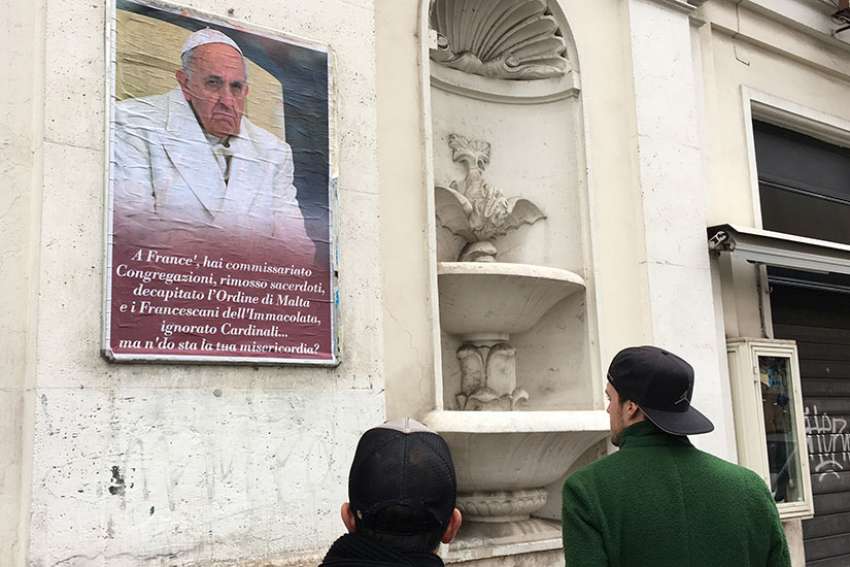Then a couple days later, the Times had another headline whopper: “Steve Bannon Cites Italian Thinker Who inspired Fascists” above an article about a speech Bannon delivered to a Vatican conference in 2014 sponsored by Catholic traditionalists.
Being one who likes a dark conspiracy theory as much as the next guy, I was naturally drawn into these reports — and the ensuing fallout from other media (both from the left and right sides of the spectrum) — by simply entering key search words into Google: Bannon and Vatican.
Plenty popped up. The resulting conflux of reports is called “media spin cycle” as more and more media outlets (and bloggers) picked up on the story — regardless if the account was built on innuendo or fact. When a story begins at the austere and left-leaning Times, it often becomes truth to many after a few spins in the proverbial media rinse cycle.
“White House chief strategist Steve Bannon is known to have cultivated ties with far-right parties in Europe, like the National Front in France,” the non-profit NPR (National Public Radio) reported to its 900-radio-station syndicate and on its website. “He also seems to have forged an alliance with Vatican hard-liners who oppose Pope Francis’ less rigid approach to Church doctrine.”
Huffington Post and others from the left immediately waded in. Naturally, a right-wing counter attack soon followed.
“The left-wing Huffington Post stooped to innuendo, slurs, and outright fabrication to manufacture out of whole cloth a dark conspiracy by Donald Trump’s chief strategist Stephen K. Bannon against Pope Francis,” countered Breitbart News, a website Bannon once headed. “Piggybacking on a baseless New York Times article by Jason Horowitz that imagined close ties between Bannon and ‘traditionalists in the Vatican,’ Huffington Post writer Michele Somerville goes still further, alleging that Bannon is aligning himself ‘with the ultra-conservative fringe of Roman Catholicism’ in order to wage a war on Pope Francis.”
As difficult as it may be, one must agree with the alt-right Breitbart on this one. After reading and re-reading these pieces, it feels like the New York Times reporter saw smoke, assumed there was fire, then added 2 plus 2 and came up with 5.
Yes, Bannon met with American right-wing Cardinal Raymond Burke in Rome three years ago. Yes, Burke has been an outspoken critic of Pope Francis’ progressive agenda. Yes, Francis has demoted and marginalized Burke. Yes, Bannon gave a speech quoting fascist philosopher Julius Evola and warning of Muslim extremists threatening the West.
But nowhere is there a direct line tying Bannon to some dark conspiracy to undermine, or even overthrow, Pope Francis. That’s not to say an anti-Francis Machiavellian scheme at the Vatican does not exist. But to say it unequivocally exists and that Bannon is linked to it is specious, to say the least, based on these media reports.
Two interesting things, however, pop out from this episode.
First, a good way to expunge a conspiracy is to shine light. All this talk certainly does that, whether there is one or not being hatched upon the Pope. Not only is Francis fully aware of possible lurking dangers, but those loyal to him (such as all those in church who pray for him during each Mass) should be fully aware.
As the great conspirator, Niccolo Machiavelli, once said: “No enterprise is more likely to succeed than one concealed from the enemy until it is ripe for execution.” If there is a conspiracy, the element of surprise is long gone.
Second, it is quite incredible the disrespect shown to Francis by his opponents. Such disrespect was not shown to more traditionalist popes, such as St. John Paul II, by progressives who opposed some of his actions.
For example, there have been posters appearing in Rome lately with a grumpy looking Pope sitting in a chair with this caption in Roman street dialect: “Hey, Frank, you took over Congregations, suspended priests, decapitated the Order of Malta and the Franciscans of The Immaculate, ignored Cardinals…. Where the heck is your mercy?”
Maybe it is today’s world of social media that breeds such disrespect, but even in the darkest days of John Paul’s papacy when he was criticized by many for failing to respond appropriately to the sex abuse crisis, he was never mocked in such a way.
Indeed, when progressives questioned any of John Paul’s actions, traditionalists had a standard response: “He is the Pope who God gave us.” Instead of stirring up opposition to Francis, traditionalists should follow their own advice.
(Brehl is a writer in Port Credit, Ont., and can be reached at bob@abc2.ca, or @bbrehl on Twitter.)

